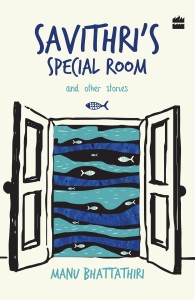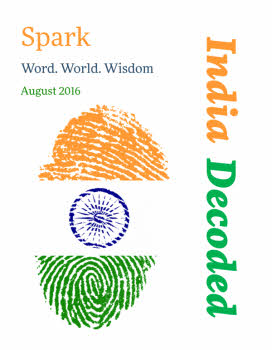by Ananya Sarkar
Manu Bhattathiri
Savithri’s Special Room and Other Stories
HarperCollins Publishers India, 2016
Pages 202, Paperback, Price Rs 399
The award-winning English author Neil Gaiman once said, “Short stories are tiny windows into other worlds and other minds and other dreams. They are journeys you can make to the far side of the universe and still be back in time for dinner.” Manu Bhattathiri’s debut book Savithri’s Special Room and Other Stories brings Gaiman’s words to life and deftly succeeds in making itself delightful.
This collection of short stories is set in the fictitious South Indian town of Karuthupuzha peopled by lively grey characters who add colour and zing to the otherwise sleepy locale and humdrum existence. The tales range from a police inspector’s struggle to accept his impending retirement, a quiet, sensitive boy’s dilemma in confessing his love, exploration of the equation between a staunch rationalist and his superstitious wife to an old couple whose monotonous life changes yearly when their son comes to visit with his family. Each story is different from the other in theme and content, which imparts a kaleidoscopic characteristic to the book.
It would be best to read the stories in the linear order as in that way, events and characters can be appropriately related. A random reading could rob some of the significance and import intended by the writer. The characters recur in the stories, which remind us that they are all inhabitants of the closely knit town where lives criss-cross seamlessly.
The narrative voice is wry yet humane and the tone is conversational, which immediately puts the reader at ease. It appears as if we are receiving the stories as they would be told by our next-door neighbour or a close friend. The uncomplicated life of Karuthupuzha with its trivial problems and minimal technology (there are only fleeting references to the radio, telephone and VCR) is a refreshing break, especially for city dwellers caught up in a fast-paced life. The town has an old world charm that will appeal to most. Bhattathiri also invests nature, including the river in the town, birds, trees, clouds and even insects such as bedbugs, earthworms and flies, with narrative significance. All of these participate in and contribute to the unfolding of the stories. This technique is innovative and creditable.
Another notable feature of the book is the scintillating humour that is interspersed throughout. There is something inexorably preposterous about an artist who paints in pitch darkness or blindfolds himself while painting because “his pictures came straight from his soul,” a hot-headed ruffian who buries his anger by digging a pit in the ground so that with time it would grow into “an ominous tree” and a social recluse and dealer of porn magazines who finds it delightful to be involved in a scandal, albeit a false one. Some of the descriptions of characters and incidents are also infused with rib-tickling comicality which is endearing.
The writer’s prowess is also manifest in certain descriptions that overwhelm with their poetic quality. For instance, the effect of the sun’s first rays on Karuthupuzha is recounted thus, “The first rays of the sun transformed the air into a precious molten metal that bathed all things in its breathtaking glow. A thin coat of this air turned gold and vermilion and settled upon the leaves of trees, feathers of birds and eyes of people. Karuthupuzha turned into an intricate ornament each dawn. And it was at such times that you wondered who was responsible for the magic of this dreamy land.” At another point, regarding a secret admirer’s first love letter to his beloved confessing his feelings, the narrator says, “It would be the first love letter of his life, and it would be a paper boat that carried the load of his pure, deep and hurting fondness for her across the ocean that separated them.”
The time period of the book is unclear. There is no mention of any particular event or occurrence which would help to locate it in the time scale. The stories may be set at a time before the telephone and television became common household appliances. However, there is also the possibility of the contemporary age as the backdrop with Karuthupuzha being one of those places stowed away in some nondescript part of India relatively untouched by the rapid advances of civilization.
Each of the nine stories invariably ends with a twist that leaves the reader amused, shocked, wistful, gratified or spellbound. Some of the most memorable are ‘The Man Who Knew God,’ ‘Paachu and the Arrogant Tuft,’ ‘Savithri’s Special Room,’ ‘A True Liar’ and ‘The Scandal.’ All the tales are unique, lean away from the arcs of prediction and engage us effortlessly. The book rounds off on a happy note with a sweet, mythic, fairy tale-like ending that is immensely satisfying. All evil elements are vanquished, misunderstandings cleared and worries swept apart as the town comes together to celebrate one of the most joyous occasions which had ironically taken birth from a notorious scandal. The festivities, merriment and good wishes of the people serve to reassert our faith in humanity and establish the power of love over everything else.
In their mood and tenor, the stories are reminiscent of R.K. Narayan’s Malgudi fiction (Swami and Friends). It is also worth noting that the title story ‘Savithri’s Special Room’ invariably reminds any R.K. Narayan fan of his novel The Dark Room in which the lead character Savitri would retreat into the dark room – her only private place – whenever she was angry and hurt. Bhattathiri’s story however, is different. Nevertheless, there is an earnest effort on the part of the writer to draw a parallel to the late Sahitya Akademi Award winner.
The cover design by Paru Ramesh deserves mention for its creativity. The picture of an open window giving a peek into various fish swimming in the water is similar to the book offering us a glimpse of the cosy, gossip-laden Karuthupuzha that is a world in itself. It is symbolic and effective.
However, it is worth noting that the book might not appeal to unwavering realists who prefer to discard the coloured lens while viewing the world. It might also, to a certain extent, bore those who rely greatly on electronic gadgets and the social media for entertainment, due to the near-absence of the same in the fiction. There are chances that they may not be able to relate to this alienation from modern-day technology.
On attentive reading one also notices an avoidable drawback, namely inconsistency in the usage of American English. While the book follows American English spellings for the most part, there are lapses into British English at certain points. Also, on page 94 there is a typographical error in the sentence “Coconut leaves where stripped and cut to form arrows” with the use of “where” instead of “were.” These point out the careless editing and revision, and an unfortunate overlooking on the part of the writer, editor and publisher. Devotion of more time could have easily prevented these and made the book more professional.
Nevertheless, on the whole, Savithri’s Special Room and Other Stories is an enjoyable read and a complete entertainer that will do justice to the space occupied on the bookshelf.







[…] Spark Magazine […]